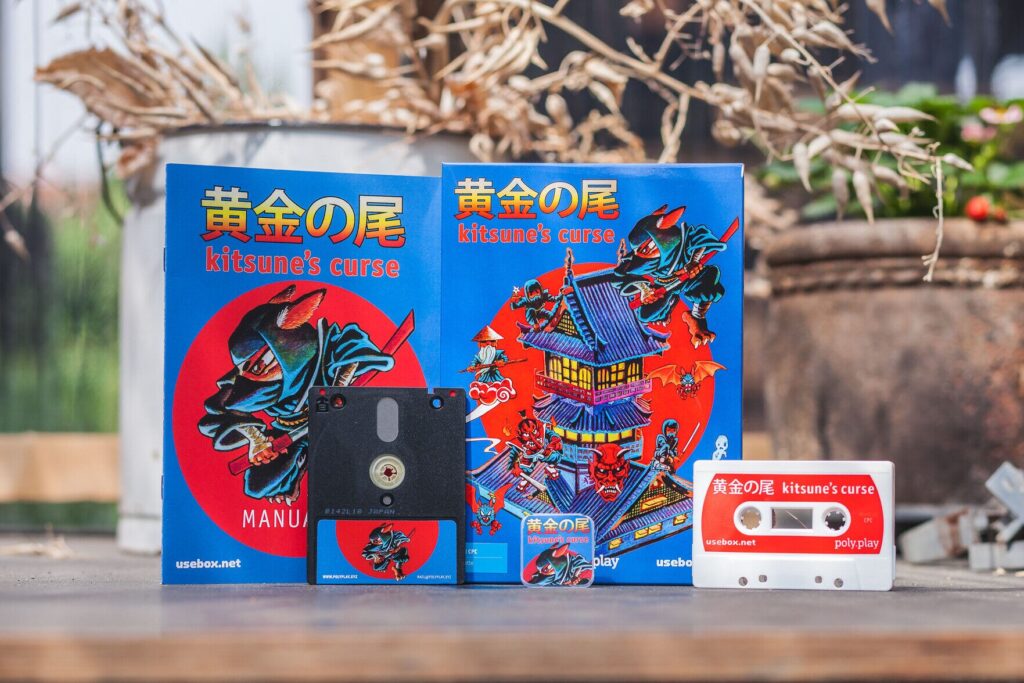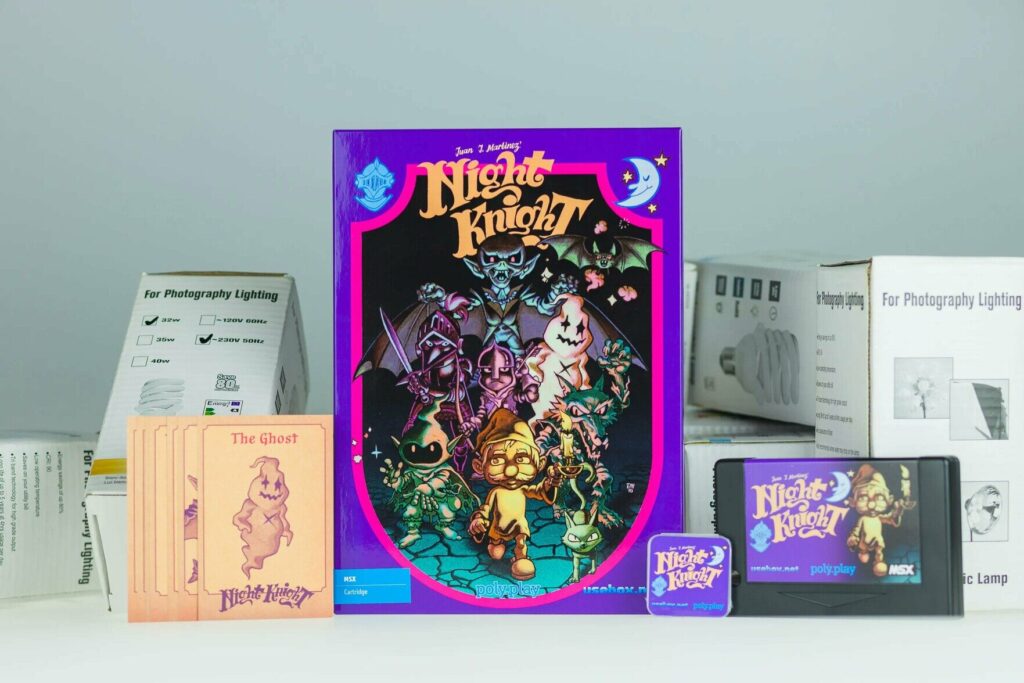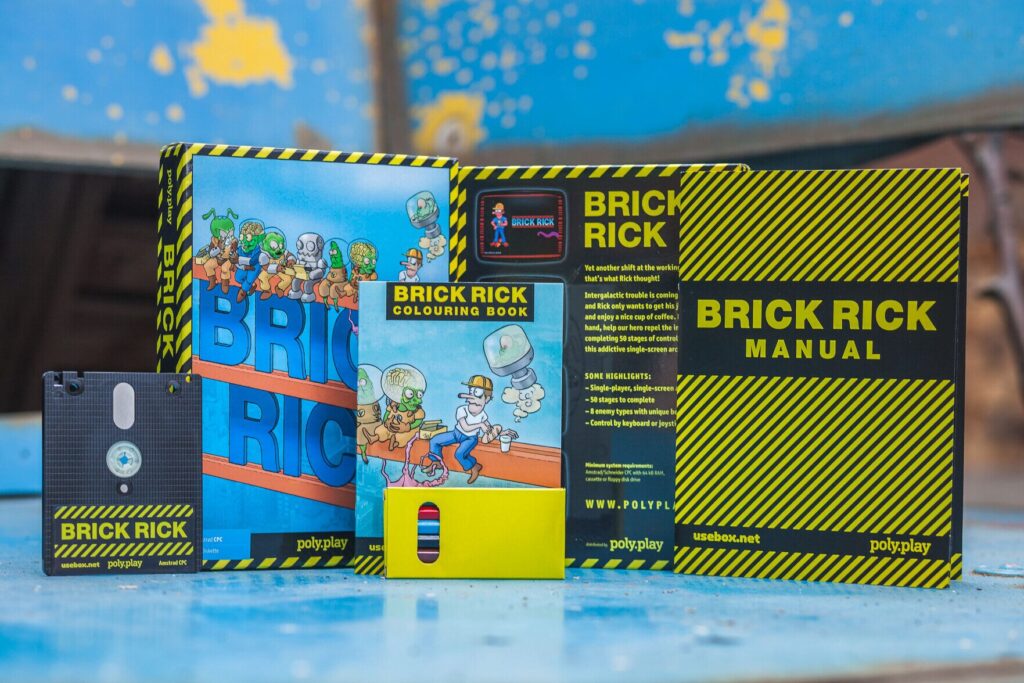Fresh New Games for Classic Hardware
Juan J. Martinez is an independent video game developer with a focus on making new games for retro systems. His website usebox.net boasts an impressive diverse portfolio of 35 video games created for the Amstrad CPC, Commodore 64, DOS, MSX, PC, Web, and ZX Spectrum systems. He is a professional software engineer based in Bristol (UK).
I was obviously impressed with not only the amount of games he has developed for our dearest retro systems, but also the quality. I wanted to get a sneak peak into the mind of this creative genius. After reaching out to Juan, he kindly agreed to be interviewed:

Tell us a little about yourself – where you grew up, etc.
I’m a software engineer, originally from south-east Spain and currently living in Bristol (UK) with my wife and two boys. I make microservices in my day job and, in my free time, sometimes I make games.
What inspired you to be a programmer and when did you begin programming?
It all started with the ZX Spectrum. My cousins had one, I think initially a 16K model that later they traded for a 48K model paying a bit more. Back then it was “a computer”, and I don’t think I was aware of the different systems.
A few times that I visited my cousins we played games, of course, but my older cousin also showed me a bit of BASIC and I found it full of possibilities.
Eventually I got my parents to buy me a computer and I started programming when I was 12.
What was your first computer?
When I asked my parents for a computer, I got a ZX Spectrum +2A (with 128K!), mostly because it was the same “brand” my cousins had.
I was also lucky because my school had a computer room with a handful of Amstrad CPC 6128. I attended some extra-curricular computing classes (BASIC programming essentially).
What is your favorite retro computer system and why?
I have a soft spot for the 8-bit microcomputers, specially the ones that were popular in Europe when I was a kid. I have made games for some of them, and I found all of them interesting for their own merits. Each system has strengths and weaknesses.
Perhaps the one I have spent more time programming for is the Amstrad CPC.
What does your development environment look like? Do you develop and compile on modern hardware or do you develop directly on the target system(s)?
I write the games using a modern editor on a Linux operating system and, thanks to a cross-compiler, I can generate binaries for the target system. Then those binaries are run on an emulator.
This makes the coding/testing cycle really short. At some point, when the game engine is finished, I do some testing in the actual machines. I have a small collection of 8-bit microcomputers at home, that I don’t use often enough!
Most systems I target have very accurate emulators available, so you can rely on them for most of the development, but I find very satisfying when I try the games in the real thing. And a couple of times that helped me finding a bug, too!
I notice that you develop for several different systems including Commodore 64, Amstrad CPC, PC DOS, ZX Spectrum, and others. What challenges do you face creating games for so many different platforms?
There are a small number of things you need to implement wherever you make a game: drawing efficiently, handling interrupts, reading the player’s input, etc. These change depending on the target system, but the core ideas behind making a game aren’t that different.
Because we live in the age of the Internet and these machines have been around for a long time, there is plenty of documentation available. Generally is not too hard getting started to make games on a new system.
You have an impressive number of titles for each retro platform, why do you regularly develop new games for these older systems?
I like the challenge, and it is also a way of setting hard limits on what you want to make. In a modern system there is always risk of scope-creep and it is hard to keep focus until you finish the project. When you are making a game for an 8-bit system, you make your plans, and once you run out of memory… that generally means the game is finished!
There are also retro-communities for those systems that are very happy to get new titles for their beloved computers. Having people playing your games is also important.
You shared that you’ve made physical editions of your games (e.g., Kitsune’s Curse). What was that process like? What did you enjoy / not enjoy about it?
I’ve been lucky that I was offered to collaborate with some publishers (PolyPlay, Monument, MatraNet or tfw8b). It is quite magic having a physical copy of your game in your hands!
The process is very straightforward: you provide the game, sometimes with some customisation (e.g. the logo of the publisher somewhere), the content of the manual, and generally some input for an artist to produce the cover art. It may take a couple months to get everything ready, but that’s nothing compared with the time that takes programming the game.
I have a personal rule that my games must always have a free download on my website, which means that we try to make a simultaneous release of free and physical, and that can be complicated (and a bit stressful, to be honest). Specially because if there is a bug, it is easy fix it and update the download, but not that easy to update the physical copy!
So far I have been very lucky, though. I haven’t had any breaking bugs ending in any of the physical copies.
Have you released any other physical editions of your games?
I have released Magica, Golden Tail, Dawn of Kernel, Kistsune’s Curse and Brick Rick for the Amstrad CPC, Rescuing Orc for the Commodore 64, and Night Knight for the MSX, all these with PolyPlay (they still have copies available I believe).
I got some ZX Spectrum games published over the years, but the latest one was Brick Rick: Graveyard Shift, published by tfw8b (that may have copies).


Did it feel different holding a representation of your creation in physical form in your hands?
Absolutely. Specially when you load the game in the actual hardware. But I don’t think it is just for me! The fact that in 2025 you can still buy new games for 8-bit microcomputers, in their original media, is amazing.
As far as I know, none of these publishers make a huge profit. In fact very often they are happy if they can break even. Yet, they keep doing it. That’s fantastic!
I’ve noticed you’ve released your games as freeware – can you tell me about that decision?
I make my games for my own enjoyment and, to be honest, the amount of work required would make them too expensive. So instead I give them away for free, so they are played and people can enjoy them.
If someone wants to buy me a coffee to show appreciation, that is very welcome, but it’s not essential.
What is your favorite part about creating games for retro systems?
In my opinion is very important understanding each system when designing your game. Is not only the audio and visuals, that are going to be very specific to the 8-bit machine you are targetting, but also the gameplay.
Back in the day there were conversions from arcade machines and ports from other systems, that not always resulted on good games because the limitations of the target system.
What I enjoy most is finding how to make a good game for the system I’m working on. If I’m making an Amstrad CPC game, I want to make a good Amstrad CPC game!
Do you create any games for modern platforms (PC/Mobile)?
I started making games for modern systems, but I found very hard finishing them. At some point I started doing game jams, that are game development competitions with time constraints, and that helped. But I feel more comfortable when I’m working with older systems.
I still like making games for PC, it just requires much more time.
Do you enjoy playing games also or is the creation part more your jam?
I guess when you start making games, in a way, you start enjoying them less because you start thinking: I could program this or that.
It is also true that making games requires pretty much all my free time, but I still like playing games from time to time.
Did you work at any game companies making games back in the 80’s or 90’s? What was that like?
I didn’t. I was too young for most of that, and in the late 90 there was the awkward transition from DOS to Windows as well, so my gamedev journey started early 2000s but only as a hobby.
What is your favorite type of game?
I have enjoyed most genres, to be honest. Most of them as they happened! Although I probably have a soft spot for RPGs.
Did you have a programming “hero” growing up? Someone you admired/ looked up to?
I didn’t pay too much attention to the credits when I played ZX Spectrum games, but some names I remember from the magazines. In Europe there was a time that the coders were treated a bit like rock stars, and you had people like Jeff Minter, Raffaele Cecco, Andrew Braybrook or The Oliver Twins, that were mentioned or even interviewed sometimes.
I think I looked more at companies. In Spain we had Opera, Dinamic, Topo or Zigurat, and those were names associated with “good games”, but I was too young to really follow anybody’s steps.
What is the biggest challenge of creating new titles for retro systems?
It depends a bit on the system but, generally, I would say debugging.
We generally don’t have access to the same modern tools you would use on a PC, so you end reading a lot of Z80 or 6502 code. Which is fun, but sometimes it can be very frustrating when you know there is a bug but you can’t find what is it.
Do you plan on continuing to create new games?
My sons are very interested so, even if sometimes I’m tired and not as enthusiastic as I was 10 years ago when I started, they kind of share some of their energy with me. I probably have some years left to make games!
I have currently a ZX Spectrum 48K game in development, although I’m a bit stuck and I need to make changes in the gameplay.
My next project is likely to be the sequel to “The Heart of Salamanderland”, for the Amstrad CPC; but it is a bit early. I’m still planning and trying to figure out what do I want to make 😀 A lot of work for a 64K game!

You have several DOS games available. I’ve played Alien Intruders and it immediately reminded me of early Apogee games with the graphics and sound. Did you draw on any inspiration from any games such as Commander Keen?
Being a DOS game it feels like a DOS game, I appreciate that. Mission accomplished! I was inspired more by single screen arcade games like Bubble Bobble, Tumble Pop or Snow Bros than any specific DOS game, including some of my previous games.
I guess people’s nostalgia has a role as well. It may be a new game, but I’m sure that for them it can be a similar experience to playing games back in the day.
Do you use different programming languages for DOS games than other platforms? Is your development process different?
It isn’t that different. I use C for anything that is non time critical, and assembler for whatever that needs speed. Because I’m used to make games for 8-bit systems that use the humble Z80, when I make a game for a 386 in 32-bit is pretty much like having a super computer in comparison!
At the end it isn’t that different than making a game for a modern PC, to be honest. Is just that instead of using a library like SDL or SFML, I had to write my own routines to deal with the hardware directly.
Do you have a preferred “general purpose” programming language that you prefer to use for coding for retro systems?
I guess that is the C programming language, even if you can’t really stop doing a bit of assembler every now and then.
There is also a lot of work processing data to make it usable on the target system. For example, I draw the graphics using a modern drawing program, but the resulting PNG image is not something you can use directly in most of the machines. I do that processing writing custom tools in Python.
Finally, do you have any words of advice for someone thinking of starting to learn programming for retro systems?
I would say that it is a lot of fun! There is plenty of documentation, and even libraries that simplify things massively. Is not easy, and some coding experience is probably needed, but it can be very rewarding.
Did you enjoy this article? Click here to stay informed, support retro, and subscribe to Computes Gazette today!

Leave a Reply
You must be logged in to post a comment.